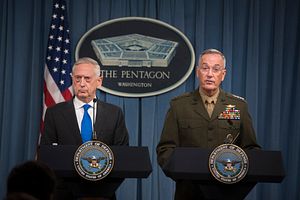There’s a bit of confusion about the future of U.S.-South Korea joint exercises amid the fizzling diplomacy between Washington and Pyongyang. In a joint press conference on Tuesday, U.S. Secretary of Defense Jim Mattis addressed the future of allied exercises, noting that, at the time, the United States had “no plans … to suspend any more exercises.”
“We will work very closely, as I said, with the secretary of state, and what he needs done we will certainly do to reinforce his effort,” Mattis added. “But at this time, there is no discussion about further suspensions.”
He additionally explained the rationale behind the suspension decisions earlier this summer, which pertained to the Ulchi-Freedom Guardian (UFG) 2018 computerized exercises and two Korea Marine Exchange Program exercises. “As you know, we took the step to suspend several of the largest exercises as a good-faith measure coming out of the Singapore summit,” Mattis said.
Those were one-time suspensions, intended to facilitate the diplomatic conditions necessary for productive talks. North Korea regards U.S.-South Korea military exercises—particularly UFG and its springtime counterparts, Foal Eagle (FE) and Key Resolve (KR)—as highly provocative.
What Mattis emphatically didn’t say on Tuesday was that exercises will be back on with South Korea. There are still seven months between now and the likely scheduled start of the springtime FE/KR exercises. Depending on where things stand with North Korea in a matter of months, the alliance may or may not choose to suspend those exercises.
The Pentagon’s own messaging was rendered confusing for much of the press after its internal news agency released an article covering Mattis’ remarks with the headline “Exercises to Resume on Korean Peninsula, Mattis Says.” Several news agencies had picked up on the headline and reported it before the U.S. Department of Defense took it down. (It was hosted at this link here; an archived version can be found here.)
Beyond the confusion, however, Mattis echoed a sentiment recently conveyed by Gen. Vincent Brooks, the commander of U.S. Forces Korea, that the high-profile suspensions of the KMEP exercises and UFG had not harmed alliance readiness. “We will find other ways to maintain readiness and that means more creativity… to make sure we do not atrophy in our readiness while this diplomatic effort is ongoing,” Brooks had said earlier in August.
Mattis, similarly, acknowledged that there “are ongoing exercises all the time on the peninsula”—just not the major ones that draw North Korean scorn. “The reason you’ve not heard much about them is North Korea could not in any way misinterpret those as somehow breaking faith with the negotiation,” Mattis said.

































